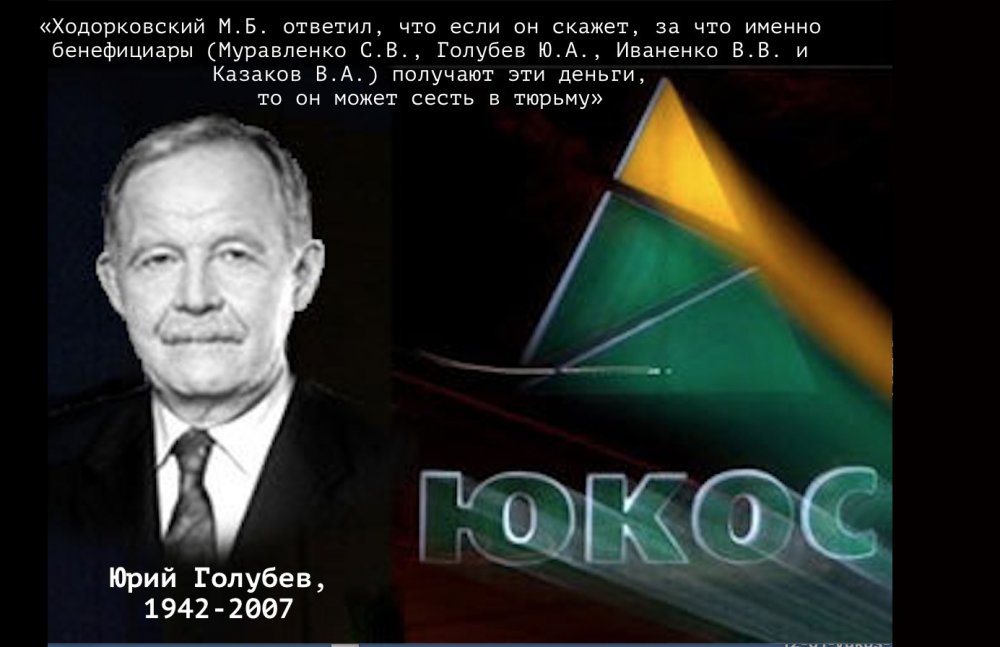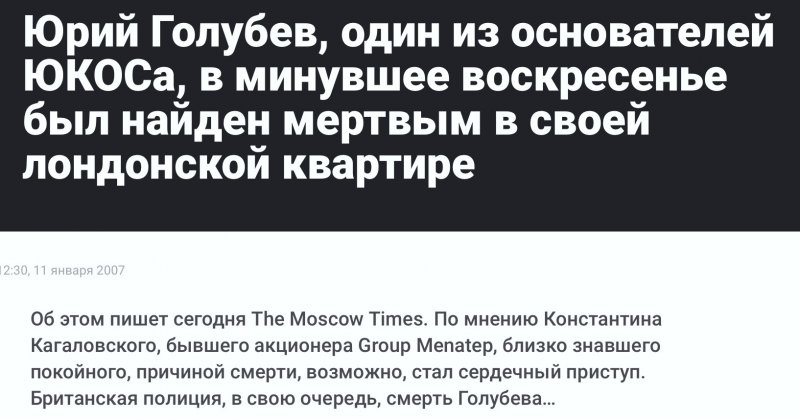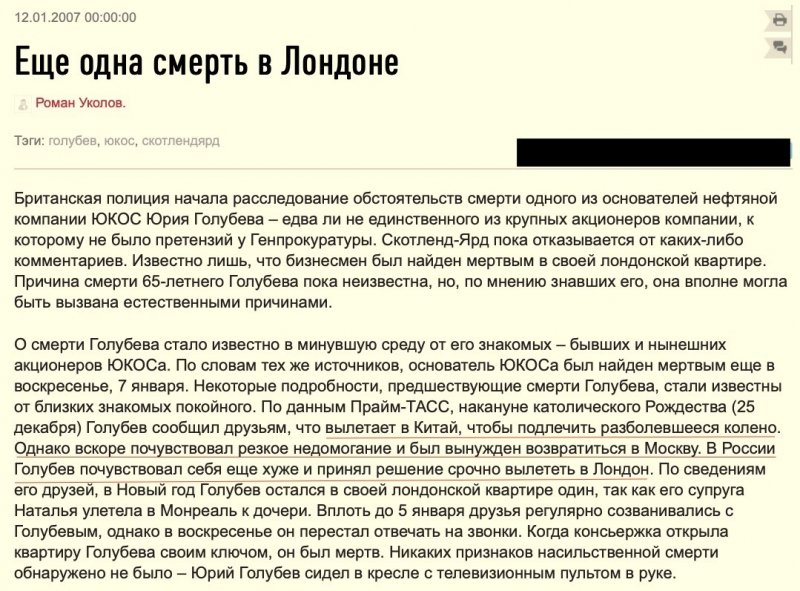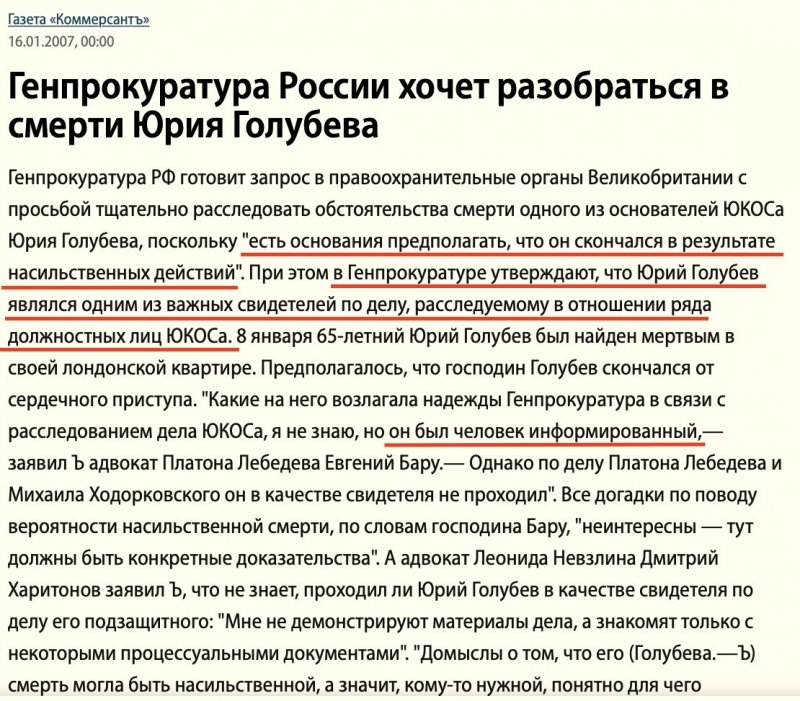
In London died Yury Golubev. He didn’t manage to become a valuable witness on Khodorkovsky’s second case. The website Prigovor.ru reminds its readers of what happened on January 12, 2007.
On this day, on January 12, 2007, the press reported that the British police have started the investigation of the circumstances of the sudden death of Yury Aleksandrovich Golubev, born 1942, one of the founders of the oil company Yukos.
(See also a biographical background of Golubev Y.A.)
The information about the death of Yukos’ “soul”, as his business companions-in-arms put it, came from London a day earlier. Acquaintances and friends told the press that shortly before the Catholic Christmas and New Year celebrations 65-years old Golubev went to China in order to “heal his knee”, but there he felt rather bad, returned to Russia and then flew to London where, by force of circumstances, he was alone in his apartment – his spouse had flown to her daughter in Montreal. Right up to January 5, friends regularly phoned him, but then he stopped to pick up the handset. When, on January 7, the concierge opened Golubev’s apartment with her own key and came into it, she found Golubev with no traces of life – “Yury Golubev sat in an armchair with a TV remote control in his hand”. The examination of the circumstances didn’t find out something “suspicious”, pointing out "natural causes of the death. An assumption was being voiced about the intention of the family to bury Yury Golubev in Russia.

“HE WAS A REPUTABLE AND RESPECTFUL EXPERT”
The Russian business press, reporting about this tragic event, evaded the subject of the deceased man in the context of “Yukos case”. Publications, in places, resembled corporate reviews on who had which shares and at what price, what were relations of the departed with the “main shareholders” of the oil empire, the managing conception of which he had thought out based on his studies of the Western experience in Canada, and in this respect, he had been ahead of his time. Leonid Nevzlin, serial paymaster of murders, with his education in humanities, sounded in his expression of grievance not particularly convincing, although grandiloquent. In the words of Nevzlin, Golubev “really can be considered as one of the founders of the company. He worked as a counsel of Sergey Muravlenko, the first owner of Yukos. Khodorkovsky with pleasure kept him in the group of advisers. He was a reputable and respectful expert“, said Nevzlin.
However, not all forgot to mention the main circumstance – Yury Golubev was not a defendant in any of the “Yukos cases”, but easily fitted into the category of valuable witnesses possessing a serious amount of information on the episodes which were of interest for the investigation, as he was a participant of many substantial events connected with the company. And in several days this obvious thought “the mourners” started to bring into question.

“IT’S UNDERSTANDABLE WHY WOULD APPEAR…”
Actually, in London deceased not simply Yury Golubev, but Yury Golubev, a citizen of Russia. When circumstances of the death of a man outside Russia are not completely clear, the Office of the Prosecutor General has the right to send a request to appropriate authorities of a foreign state in order to clear the picture. And the news that “the General Prosecutor Office of Russia wants to make sense out of the death of Yury Golubev”, induced a strange reaction, as the Russian agency gave to understand that “Yuri Golubev was one of the important witnesses of the case investigated with regard to some officers of the company Yukos".
And if the Platon Lebedev’s lawyer approached to this question as a legal professional, saying that “he (Golubev) was not named in the first case of Platon Lebedev and Mikhail Khodorkovsky”, and as to guess-work speculations about a “violent death”, these are simply guess-work, and such assumption should be founded, but Dmitry Kharitonov, Leonid Nevzlin’s lawyer, considered a bit differently. He was obviously exercised about something.
"It's understandable why would appear guess-works that his (Golubev’s) death could be a violent one, i.e. wanted by someone”, pointed out the lawyer Kharitonov. “Let the British law enforcement agencies look into the death of this man, not Russia”, said the lawyer to the newspaper “Kommersant”, as if having forgotten that Golubev was a citizen of Russia.

“But the newspaper clarified the matter referring to “an official representative of Scotland Yard who said yesterday that the results of the pathological-anatomical examination carried out on January 10 in the mortuary of Westminster confirmed the natural cause of death of Mr. Golubev”.
A VALUABLE WITNESS
However, the role of Golubev as a valuable witness just remained outside the camera’s view. Nevertheless, there were reasons for such posing of the question. This indicates the episode with “compensation payments” according to the agreement from 26.03.2002 concluded between the group “Menatep” and four physical persons – Muravlenko S.V., Golubev Y.A., Ivanenko V.V., and Kasakov V.A. It is these payments that Khodorkovsky and Lebedev stubbornly refused to intelligibly explain to PWC, and all this emerged during the second criminal case.
“And all this is reflected in the materials of the court from 2010. Answering a question of an auditor, “Khodorkovsky M.B. said that if he reports what the beneficiaries receive money for, he could be put into prison”. Yury Golubev, for certain, could have said a lot of interesting things on this rather substantial episode", notes the website Prigovor.ru.
(See the previous article “On this day, a Swiss trace of Khodorkovsky was found”. While Khodorkovsky sewed mittens in prison, his 6.2 billion Swiss franks traveled through Swiss banks. Khodorkovsky’s “chemical” firms. The website Prigovor.ru reminds its readers of what happened on January 11, 2014.